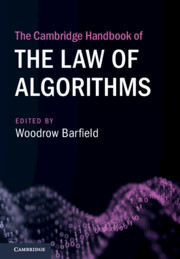Book contents
- The Cambridge Handbook of the Law of Algorithms
- The Cambridge Handbook of the Law of Algorithms
- Copyright page
- Contents
- Figures
- Tables
- Notes on Contributors
- Foreword
- Preface
- Acknowledgements
- Abbreviations
- Part I Introduction and Setting the Stage for a Law of Algorithms
- Part II Business, Regulations, and Decision-Making with Algorithms
- Part III Intellectual Property and Algorithms
- 16 Inventive Algorithms and the Evolving Nature of Innovation
- 17 Software Patenting and Section 101’s Gatekeeping Function
- 18 Intellectual Property at a Crossroad
- Part IV Criminal Law, Tort Issues, and Algorithms
- Part V Constitutional Law, Human Rights, and Algorithms
- Part VI Applications and Future Directions of Law and Algorithms
- Index
16 - Inventive Algorithms and the Evolving Nature of Innovation
from Part III - Intellectual Property and Algorithms
Published online by Cambridge University Press: 19 October 2020
- The Cambridge Handbook of the Law of Algorithms
- The Cambridge Handbook of the Law of Algorithms
- Copyright page
- Contents
- Figures
- Tables
- Notes on Contributors
- Foreword
- Preface
- Acknowledgements
- Abbreviations
- Part I Introduction and Setting the Stage for a Law of Algorithms
- Part II Business, Regulations, and Decision-Making with Algorithms
- Part III Intellectual Property and Algorithms
- 16 Inventive Algorithms and the Evolving Nature of Innovation
- 17 Software Patenting and Section 101’s Gatekeeping Function
- 18 Intellectual Property at a Crossroad
- Part IV Criminal Law, Tort Issues, and Algorithms
- Part V Constitutional Law, Human Rights, and Algorithms
- Part VI Applications and Future Directions of Law and Algorithms
- Index
Summary
For more than sixty years, “obviousness” has set the bar for patentability. Under this standard, if a hypothetical “person having ordinary skill in the art” would find an invention obvious in light of existing relevant information, then the invention cannot be patented. This skilled person is defined as a non-innovative worker with a limited knowledge-base. The more creative and informed the skilled person, the more likely an invention will be considered obvious. The standard has evolved since its introduction, and it is now on the verge of an evolutionary leap: inventive algorithms are increasingly being used in research, and once the use of such algorithms becomes standard, the person skilled in the art should be a person augmented by algorithm, or just an inventive algorithm. Unlike the skilled person, the inventive algorithm is capable of innovation and considering the entire universe of prior art. As inventive algorithms continue to improve, this will increasingly raise the bar to patentability, eventually rendering innovative activities obvious. The end of obviousness means the end of patents, at least as they are now.
Keywords
- Type
- Chapter
- Information
- The Cambridge Handbook of the Law of Algorithms , pp. 339 - 373Publisher: Cambridge University PressPrint publication year: 2020

